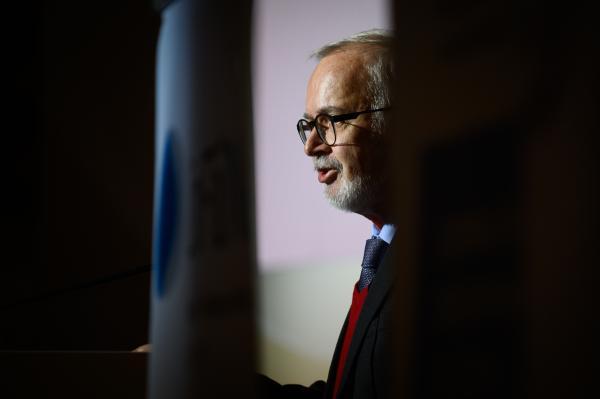EIB President Werner Hoyer delivered the opening speech at the European Microfinance Week Award Ceremony at the EIB’s headquarters on 17 November.
Check against delivery

Good evening Your Royal Highness,
Dear Minister Fayot,
Distinguished guests and Microfinance friends,
Ladies and Gentlemen,
I am delighted to welcome you to the EIB for tonight’s award ceremony to recognise best practice in global microfinance!
This is the first in-person Award Ceremony in three years!
Three years that tested all microfinance institutions around the world, with uncertainty, abrupt barriers to travel and trade, and the shutdown of entire sectors.
Three years that tested Europe’s vision and positioning around the world that made the path for the achievement of the Sustainable Development Goals steeper.
Over these three years, at EIB Group we kept on working to increase our impact, leveraging also on our microfinance expertise, a very important asset in our toolbox.
- I am proud to say that up to date, the Bank has committed €1.8 billion to microfinance operations around the globe, with close to €800 million in Africa alone.
- And we have reached the most vulnerable groups, in particular the poor underserved women – the main focus for this award as well.
However, in the current global context, it is clear that there is no time for complacency. We cannot stop here. We need to:
- keep innovating and ensure that we meet more efficiently the most pressing needs,
- continue exchanging best practices to unlock greater impact, drive social inclusion amongst previously excluded communities, and
- apply smart economics: make finance work for women.
This is why our decision to launch EIB Global - our new arm for global development and partnerships - is, I believe, spot on. Through EIB Global, we are forging even closer cooperation for development support and partnerships worldwide, in times of massive needs.
The severity of the impact of COVID-19 on microfinance around the world has been recently highlighted by the global research commissioned by Luxembourg based ADA (Appui au Développement Autonome).
It was striking for me that more than 90% of microfinance clients saw their household income deteriorate, with the greatest drop among women.
We, as a community, are already responding to these developments with increased support, new initiatives, innovative gender-tailored products, training, and capacity building.
Women-led businesses can have a transformative effect:
- they employ more women;
- are more likely to innovate and to make a difference on the environment;
- are more likely to introduce good management practices.
Yet – access to finance remains an obstacle for women-led enterprises.
This conclusion is just unacceptable and we must take more enabling measures for women-led businesses to thrive.
- Mary Ellen, your book “There is Nothing Micro About a Billion Women” makes this important point about the business case of investing in women.
- Our own EIB Finance in Africa report confirmed that Banks are stepping up efforts on gender lending.
- and this also means an improvement in balance sheets. Four in ten banks found that non-performing loan rates for women-led businesses were lower than the average rate of their loan portfolios.
At the EIB, our teams have put gender impact at the centre of our microfinance activities: close to 50% of the new business financing unlocked by the EIB Global loans in Africa support female entrepreneurs.
Women empowerment is in the focus of both our investments and our technical assistance programmes.
I am particularly proud that the EIB’s SheInvest initiative launched in Nairobi three years ago has already mobilised more than €1 billion of gender focused investment!
And only a few weeks ago, when I attended the Finance in Common Summit in Abidjan, alongside many partners, the EIB confirmed that we would further strengthen SheInvest to mobilise a further €2 billion and extend the initiative to Latin America and Asia.
It is definitely a key priority for us to help boosting gender equality and female economic empowerment across Africa - through and also beyond - microfinance.
Ladies and Gentlemen,
We meet in Luxembourg every year to strengthen our links and enhance our partnerships, focused on how we can innovate, reaching out the underserved, empower the most vulnerable and alleviate poverty.
Celebrating best practices is important, because it allows us to apply and scale up ideas what work!
Many of you here today have been able to participate in the SME banking and microfinance academies hosted by the EIB across Africa.
Over the last decade the EIB has provided dedicated training for financial professionals in 288 banks and microfinance partners.
This ongoing cooperation has enable nearly 40,000 African microfinance and banking professionals to share innovative ideas on financial inclusion, climate risk and targeted lending to women and young people.
Similar workshops have strengthened the financial skills of more than 45,000 final beneficiaries including from market sellers to sewing cooperatives, and refugees.
Your Royal Highness, Minister, dear friends,
Ensuring access to finance for micro-entrepreneurs, farmers and businesses around the world - with a particular focus on women empowerment – remains crucial, and it is among the best investments the EIB can do, and serve its mission.
Allow me to congratulate all the finalists of tonight’s microfinance awards for their commitment and impressive engagement!
Thank you